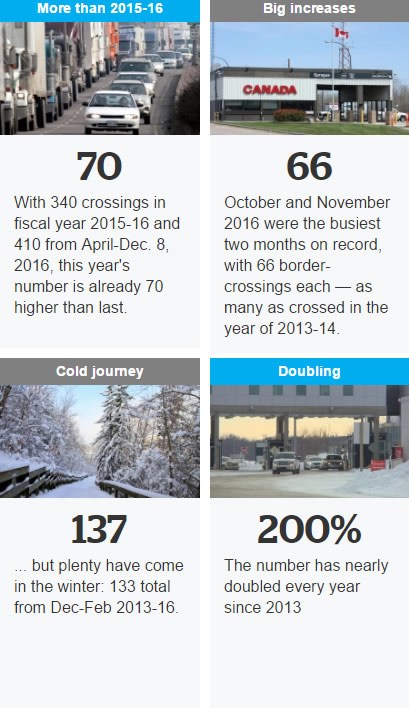
Tuesday, January 10, 2017
By Austin Grabish, Laura Glowacki
410 mostly Somali refugees made the journey across U.S.-Canada border on foot between April and December 2016
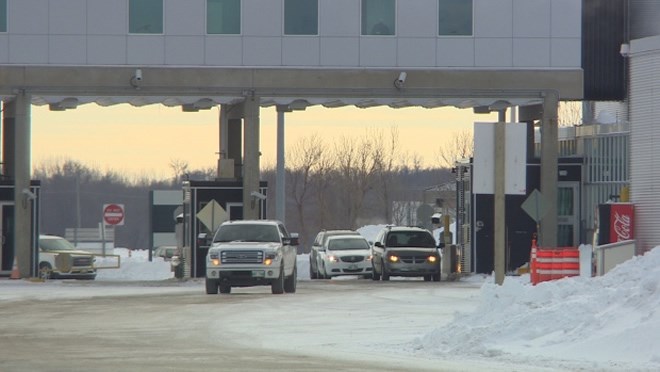
In the 2013-2014 fiscal year, 68 people illegally crossed the international border near the small, southern Manitoba community of Emerson and claimed refugee status, according to the Canada Border Services Agency (CBSA). That jumped to 340 in 2015-2016.
The number of asylum seekers crossing the Canada-U.S. border into Manitoba on foot instead of through official ports of entry has risen fivefold in the past three years.
This fiscal year's numbers have already surpassed that, with 410 asylum seekers making the journey between April and December 2016.
According to Jacquie Callin, a CBSA spokeswoman, most of those crossing near Emerson are from Somalia, which has been wracked by civil war and political instability since the overthrow of military dictator Siad Barre in 1991.
Canada has the reputation of being a land of liberty and appeals to the unprecedented number of refugees displaced by the world's various conflicts and crises, said immigration lawyer Bashir Khan.
"What we are seeing as Canadians at our borders is basically a symptom of what a chaotic, messed-up world we live in," he said.
Khan said he is especially troubled by the number of people crossing unsupervised sections of the U.S.-Canada border in the cold winter months.
The potential dangers of that trek were highlighted by the harrowing story of two men from Ghana who are recovering from frostbite after walking into Canada and getting lost on Christmas Eve.
CBSA reports 119 asylum seekers came to Manitoba in the coldest winter months between December 2015 and March 2016 without passing through a port of entry or border checkpoint.
"Normally, we don't get refugee claimants arriving from the U.S. in the winter by foot," said Khan. "These desperate souls … are coming to Canada at such great risk."
Under the Canada-U.S. Safe Third Country Agreement signed in 2002, individuals must seek asylum in the country in which they first arrive, with a few exceptions. For instance, if a Somali refugee who arrived in the United States presented themselves at the Canadian border seeking asylum, they would be sent back to the U.S. unless they had family in Canada.
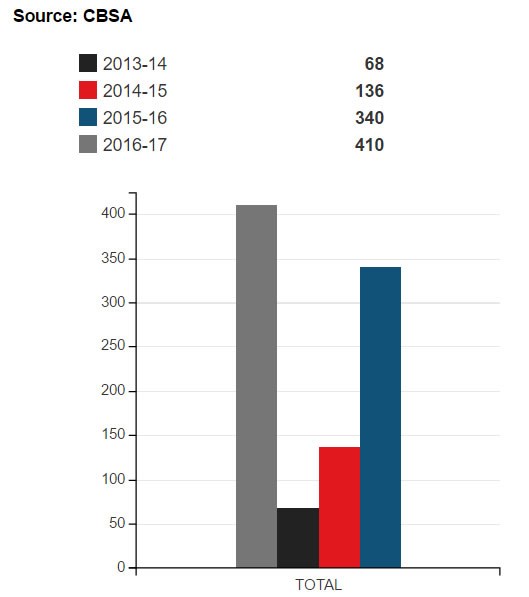
Refugees can avoid being turned back by crossing somewhere other than an official port of entry or border checkpoint.
It's that threat of being turned back at official border crossings that is largely behind the increase in the number of asylum seekers circumventing official checkpoints, said Janet Dench, executive director of the national non-profit Canadian Council for Refugees.
'Someone is going to freeze to death'
People entering the country without visas or proper immigration papers have been spotted walking through fields and gravel roads near the border in Emerson, whose southern boundary borders the states of North Dakota and Minnesota.
Doug Johnston, a councilor for the rural municipality of Emerson-Franklin, said the fire department frequently responds to well-being calls involving asylum seekers who've just walked into Canada. Last week, it received at least two medical calls, he said.
"My guess is if this keeps up, somebody's going to get caught between the ports and probably perish, because it's like –25 C, and the snow's up to your waist right now," said Johnston. "Eventually, someone is going to freeze to death out there."
RCMP D Division patrols 520 kilometres of the Canada-U.S. border, the world's longest undefended border. When officers find a person trying to illegally cross, they bring them to the nearest port of entry to be assessed by a CBSA official.
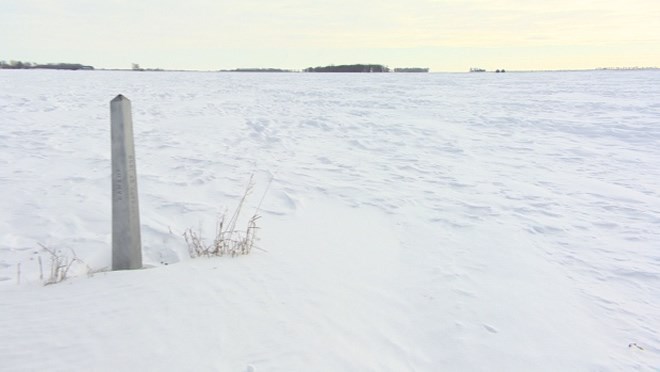
This marker in a field near Emerson, Man., signifies the start of the U.S. border. Across the field, is North Dakota. (Ron Boileau / CBC)
If there's no admissibility concerns and the person's refugee claim is legitimate, they are released and a date is set for the claim to be heard.
Local farmer Howard Friesen said a refugee from Somalia — where many of those crossing into Manitoba are from — stumbled across one of his fields two years ago.
"I saw something and it was moving on my field ... From the distance, you know, you thought oh maybe it's a deer," said Friesen, who farms in Halbstadt.
It wasn't a deer but a man coated in mud.
"One of the first things he asked me was, 'Am I in Canada?' and he asked me that three or four times," he said.
Friesen said he brought the man into his house to let him shower and eat breakfast.
"He ate six eggs and six pieces of toast," said Friesen. "He was hungry. He had been walking a while."
The Trump effect
Immigration lawyers expect the number of asylum seekers crossing on foot to rise after U.S. president-elect Donald Trump takes office.
Trump has vowed to send Syrian refugees already accepted in the U.S. back to their home country, ban Muslims from entering the country and build a wall along the U.S.-Mexico border to curb the flow of migrants.
Khan said he expects to see a spike around the time when Trump takes office until refugees get a sense of the direction in which the new president may take immigration policy.
'To become a refugee is not a choice'
Ali Saeed knows firsthand what lengths refugees will go to in order to get freedom. A refugee from Ethiopia, he was imprisoned and tortured in his home country as well as in Somalia — a country he walked 563 kilometres through the desert to get to. He now sponsors refugees himself.
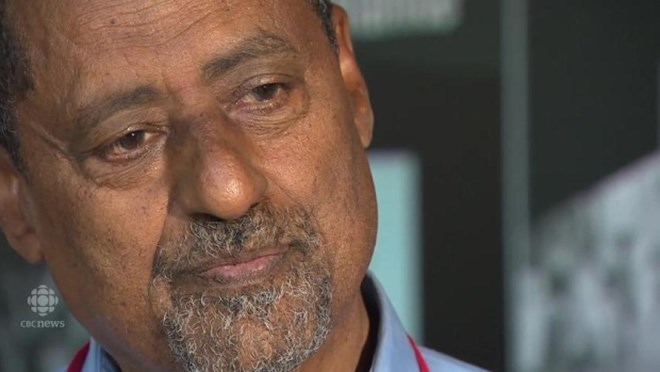
Ali Saeed was imprisoned and tortured in his home country of Ethiopia and came to Canada in 1984 as a refugee. Today, he sponsors refugees himself. (CBC)
Saeed, who came to Winnipeg barefoot in 1984, said refugees put their lives at risk to get to Canada.
"They have to suffer and pay the ultimate price. Sometimes even, they can die."
Saeed said a common misconception is that refugees come to Canada for a free ride.
"They don't like to be a refugee, but they have no choice," he said.
